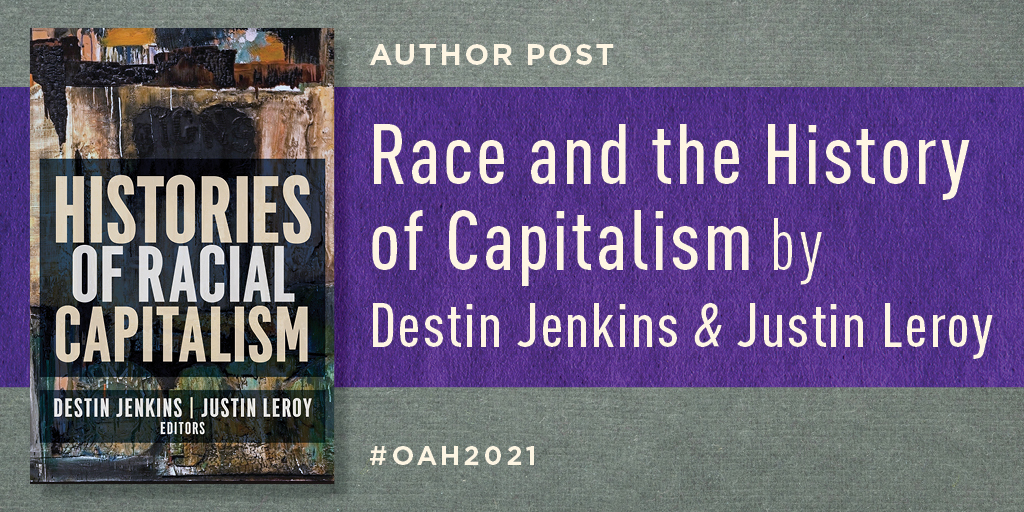Race and the History of Capitalism
By Destin Jenkins and Justin C. Leroy

In 1983, Cedric J. Robinson popularized the term “racial capitalism,” referring to the way that the violent dispossessions inherent to capital accumulation operate by creating, leveraging, and intensifying racial distinctions. But he did not invent the term. It first cohered around the struggle to end apartheid and white supremacy in 1970s South Africa, provoking contentious debate among intellectuals and activists.
In the last fifteen years, the devastating effects of the subprime crisis for communities of color, the reinforcing processes of criminalization and profit that sit at the center of the prison industrial complex, and the fight against the Dakota Access Pipeline in the name of Native sovereignty and environmental protection all are issues of racial capitalism.
In the spring and summer of last year, the explanatory power of racial capitalism became all the more apparent as the triple crises of police violence, COVID-19, and economic immiseration converged. Scholars across various disciplines and fields employed the term to expound upon the murder of Breonna Taylor and gentrification in Louisville; racial disparities in COVID-related mortality rates; and the paradoxical treatment of Black and brown meat-processing workers, bus drivers, grocery store clerks, and first responders as essential yet disposable. And with a slew of forthcoming books, articles, and courses on the subject, scholars and activists are sure to elevate racial capitalism as a way of seeing the connections among topics, themes, and processes too often held a part.
…scholars and activists are sure to elevate racial capitalism as a way of seeing the connections among topics, themes, and processes too often held a part.
Our new collection, Histories of Racial Capitalism, gathers together such stories and insists that racial capitalism is not one of capitalism’s varieties. It does not stand alongside merchant capitalism, industrial capitalism, and financial capitalism as a permutation, phase, or stage in the history of capitalism writ large. Rather, from the beginnings of the Atlantic slave trade and the colonization of the Americas onward, all capitalism, in material profitability and ideological coherence, is constitutive of racial capitalism. In other words, we reverse the basic assumption that racial subjugation is a particular manifestation of a more universal capitalist system.
The roots and routes of the term, we maintain, demand that we distinguish between the rather specific history of the term racial capitalism and the much broader idea of racial capitalism. Robinson was part of a cohort of scholars who theorized and debated the relationship between race and capitalism through histories of slavery, imperialism, and beyond. This work spans the twentieth century, and we might term this body of scholarship the “old history of capitalism.” Although these and other scholars did not use the specific language of racial capitalism, collectively their work and Robinson’s laid bare the sedimented histories of race that were deposited alongside capitalism.
Histories of Racial Capitalism is the culmination of conversations between these scholars and others trained in the disciplines of history, American studies, race and ethnic studies fields (African American studies, Asian American studies, and Latinx studies), women’s and gender studies, political science, law and political economy, and anthropology. Accordingly, the essays engage with a wide range of sources and methods, a methodological mélange we take as foundational to the study of racial capitalism.
In other words, we reverse the basic assumption that racial subjugation is a particular manifestation of a more universal capitalist system.
The underlying thread of the volume is an insistence that racial capitalism is not a moment anterior to deracinated capitalism, nor does capitalism’s racial character diminish or disappear over time. Racial capitalism marks a historical intimacy among the slave trade, enslavement, and colonialism, but also captures the way slavery epitomized a racialized system of valuation and extraction that continues to this day. Alongside indigenous dispossession, slavery inaugurated that system. Yet the system survived the end of slavery—and even thrived.
The contributors examine the historical relationship between economic relations of exploitation and the racial terms through which they were organized, justified, and contested across a wide range of contexts, from seventeenth-century New England to nineteenth-century India; in the extractive colony of the Philippines and the settler colony of Hawai’i; as expressed in the making of the New South; and as an engine of the extractive complexes of the twentieth century.
The plural title “histories” is deliberate, and the essays contribute to a larger intellectual pursuit that cannot be contained within a single collection. Nevertheless, the volume speaks to at least three empirical and methodological questions.
Yet the system survived the end of slavery—and even thrived.
Second, we have attempted to develop the analytical potential of racial capitalism by placing the concomitant development, operation, and legacies of chattel slavery and indigenous dispossession alongside one another. How are we to account for the potentially different relationship of racial capitalism to slavery and colonialism?[1]
Finally, the political theorist Shatema Threadcraft has rightly asked “what a more sustained analysis of gender would mean for scholarship on racial capitalism.” And in her own contribution to the volume, Shauna Sweeney adds, “The answer, however, is not to incorporate black women into established frameworks but to ask a different set of questions … about the place of black women and gender in the construction of the very categories that scholars use to assess politics, economics, science, and medicine.” If capitalism did not homogenize but exaggerated older distinctions into racial ones, as Robinson claimed, did capitalism also exploit “existing gender-based hierarchies as it sought to establish itself”? If so, to what effect?
These questions are vital as much for historical research as they are for addressing some of the life-truncating inequities that structure racial capitalism today.
[1] See Colonial Racial Capitalism, ed. Susan Koshy, Jodi Byrd, Lisa Cacho, and Brian Jefferson (forthcoming).
Destin Jenkins is the Neubauer Family Assistant Professor of History at the University of Chicago, and Justin Leroy is assistant professor of history and codirector of the Mellon Research Initiative on Racial Capitalism at the University of California, Davis. You can save 20 percent on their new book, Histories of Racial Capitalism and any featured OAH title when you use coupon code OAH at checkout now through June 1, 2021.







